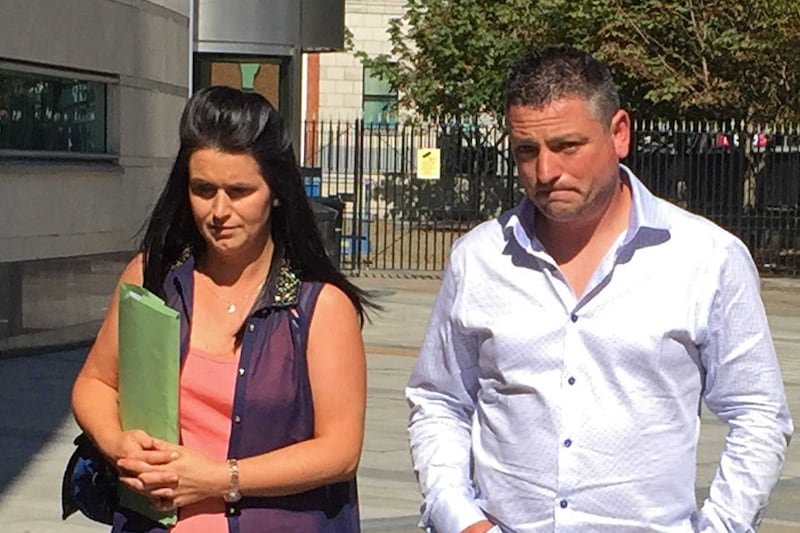LIVES have already been saved by the actions of a couple who pursued a landmark inquest for their stillborn baby daughter, a coroner in Belfast has said.
Barry and Michelle Rocks from Moneymore, near Magherafelt in Co Derry, were praised for their "fortitude" as the historic case was closed at Belfast Coroner's Court.
Coroner Joe McCrisken said: "Baby Cara should not be remembered as the baby who lost her life as a result of failures in her care but, rather the baby who has brought about positive change in antenatal care for babies and mothers in Northern Ireland."
Cara Rocks was stillborn at the Causeway Hospital in Coleraine on June 26 2013.
The Northern Health Trust, which runs the hospital, has accepted a series of failings and has implemented number of system changes aimed at avoiding similar tragedies.
Mr McCrisken said: "Thank you, Mr and Mrs Rocks for your fortitude; for seeing this through; not taking no for an answer and fighting very hard for your baby.
"I really do believe things have changed for the better.
"The actions you have taken, and the Trust, have already prevented other families going through the grief you have gone through."
Some 36,000 babies are stillborn in the UK every year, the court was told.
Three die every day in Northern Ireland either at birth or in their first month of their lives, it was revealed.
The inquest is the first to focus solely on stillbirth and Northern Ireland has legal powers which are the envy of the world, the coroner said.
Delivering his findings, Mr McCrisken levelled particular criticism at the "unsatisfactory" care following Mrs Rocks' induction of labour on June 26, 2013.
Medics lacked situational awareness and wasted valuable time during a so-called golden hour when there were difficulties in tracing Cara's heart rate, he said.
"The actions of medics who treated Mrs Rocks during this time failed baby Cara," the coroner told the court.
An incorrect recording of the heart rate as suspicious and not pathological, which means critical, was another crucial error, the court heard.
Mr McCrisken added: "I still cannot understand how all three medics (midwife and two doctors) failed to properly classify that CTG (cardiotocography).
"It is clear to me as a mere coroner without a medical degree that it showed deceleration."
The actions of Dr Ciara Daly, then a junior doctor, was also criticised for wasting time and providing incorrect information.
Her senior, Dr Deidre Lim, gave no good reason why she had not answered her pager, the court heard.
A midwife, Michaela Doherty, acted appropriately by calling a more senior doctor but it was probably too late by that stage, the coroner concluded.
"Baby Cara probably died shortly after the ARM (artificial rupture of membranes) was carried out," said Mr McCrisken.
Baby Cara was delivered by cesarean section at 16.33pm on June 26, 2013.
No pulse was detected and despite extensive resuscitation efforts she was pronounced dead at 16.43pm.
Meanwhile, the coroner also accepted that despite repeated requests for an elective c-section following difficulties in her two previous pregnancies, Mrs Rocks had been turned down during an appointment with a junior doctor at 36 weeks.
"I am satisfied Mrs Rocks was refused a c-section at this appointment. Mrs Rocks' voice on the mode of birth was not properly taken into account," he said.
Dr Rachel O'Flaherty had erroneously believed the final decision on delivery rested with her and not the mother, it was claimed.
Mr McCrisken added: "The Rocks family now consider that had a decision been made to have have an elective c-section at 39 weeks that baby Cara would be alive.
"The fact is however, that the decision to proceed to v-bac (vaginal birth after cesarean section) was not per say an incorrect decision.
"That decision did not cause the death of baby Cara."
When Mrs Rocks presented again at 38 weeks' gestation with her baby lying in the wrong position, she should have been seen by a consultant but again that decision did not cause the infant's death, the coroner ruled.
The court heard how Mrs Rocks suffered from an undetectable placental defect known as delayed villous maturation, which affects the baby's oxygen levels.
It recognised as a significant factor in the cause of around 10 per cent of stillbirths.
The cause of baby Cara's death was officially recorded as foetal hypoxia due to delayed villous maturation.
Mr and Mrs Rocks were supported in court throughout the hearing by their parents and other relatives.
They held hands and appeared visibly relieved at times as the lengthy findings were read out.
They clutched each other outside the court as Lawrence McMahon from Haughey Solicitors read a statement in which the couple said they would never forget their daughter.
"We will never forget ourt wee angel Cara. We know we cannot bring her back but we welcome the verdict from the coroner and his findings.
"We know we did what we had to do to get justice.
"It should always be the patient's decision regarding the mode of delivery. Mothers should not be afraid to ask for a second opinion if they have any doubts about decisions made.
"Mothers should ensure that their wishes are correctly recorded at each appointment. Mothers should be aware of the grade of doctor that they are speaking to at each appointment.
"Mothers' intuition and a woman's right to choose the mode of delivery is important and should be respected in each case.
"We ask that doctors and midwives treat each patient as they would treat their own mother, wife, sister or daughter."
Mr McCrisken said he would raise the case with Stormont's Health and Justice Ministers to highlight the lack of resources available for researching placental abnormalities.






